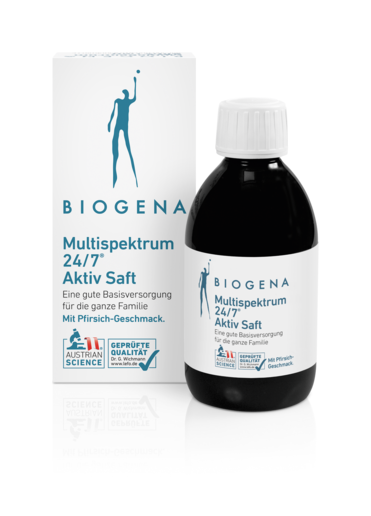Child health
Nutrition has an enormous influence on well-being, especially during periods of growth and mental exertion. Children need a sufficient supply of vitamins, minerals, trace elements and healthy fatty acids for their bodies to function properly.


Take the nasty soup away! Some children simply refuse to eat anything but their favourite food! Of course, children need resources during those intense growth and learning years. That’s why we offer micronutrients that are easy to take, even for children!
Children and healthy eating
Fussy eating habits can make it difficult to maintain a varied diet and parents’ creativity is often put to the test. The goal should be to get kids to try new foods regularly. The key ingredients here are patience and time.
Vitamin requirements in children and adolescents - what is crucial for healthy development?
Children’s nutritional requirements are particularly high during periods of growth, during which they undergo both physical and mental changes. Children who take part in sports (football or tennis, for example) several times per week also have higher nutrient requirements.
Whether your child is making the transition from toddler to child or from child to teenager, their need for vitamin C will be especially high during growth periods. Vitamin C not only supports the immune system, it also helps the body to maintain normal energy metabolism. In addition, it plays an important role in the nervous system and mental health. Depleted vitamin C stores can hurt general well-being.
Maintaining a good vitamin D balance is also essential for children. This vitamin is particularly important for healthy bones and muscles. Vitamin D is also known as the sun vitamin in this part of the world and has an important role to play in the immune system. During the winter months, our body relies on the vitamin D stores accumulated during the summer. However, if we do not produce enough vitamin D during the summer (e.g. as a result of spending too much time indoors), this can lead to a lack of valuable vitamin D during the less sunny time of year.
Combating fatigue and tiredness during periods of growth: this is a job for the trace element iron! It also supports the immune system and energy metabolism. Growing children and adolescents need it primarily to support muscle mass, since iron is the main component of the red muscle pigment myoglobin.
Calcium is also essential for healthy growth. It is primarily needed for the formation of the musculoskeletal system as it contributes to normal bone and muscle development. It also supports the body’s energy metabolism. Calcium is mainly found in dairy products such as milk, yoghurt, buttermilk and cheese. Certain vegetables, especially greens, also contain a significant amount of calcium. These include broccoli, spinach, peas, leeks and kale. Sesame seeds, almonds and walnuts are also rich in calcium.
One frequently underestimated trace element with an important role to play in child growth is iodine. It can be difficult to take in enough of this mineral via a normal diet because the food we eat here in Europe is generally low in iodine. Iodine is important for the thyroid gland, which has a particularly demanding role to play during puberty because this when most children undergo a sudden growth spurt. Iodine also affects cognitive functions and the nervous system.
NEWS IN SCIENCE
Looking for micronutrients reveals a need for remedial action
What is the situation regarding the nutrient supply for our youngest EU citizens? This question was addressed by a team of researchers who published their results in the journal “Clinical Nutrition”.
Nine tips for parents: Proper nutrition to maintain your child’s health and prevent disease
Proper nutrition to maintain your child’s health and prevent disease
1) Drink plenty of fluids!
A healthy and balanced diet starts with the proper intake of fluids. For children, the recommended amount is around 1.5 to 2.5 liters per day. Water, diluted fruit juice, and unsweetened herbal tea should make up the bulk of this. Sweet drinks, soda, or drinks containing caffeine should only be allowed on special occasions. In addition to drinks, fruit, and vegetables can also help keep the body hydrated during the day.
2) Don’t forget your 5 a day!
The German Nutrition Society recommends a daily intake of five portions of vegetables and fruit - divided into three portions of vegetables and two portions of fruit per day. A mixture of raw, steamed, and boiled vegetables is ideal.
3) Be a dairy princess (or prince)
Dairy products such as yogurt, milk, and cottage cheese are important sources of calcium and therefore an indispensable part of a child’s diet. Calcium is needed to maintain healthy teeth and bones. It also supports muscle function and influences cell division.
4) Breakfast like a champ
Breakfast is the most important meal of the day. Children need to boost their energy levels in the mornings to get their day off to a good start. Why not try granola with yogurt and fruit? This is easy to prepare and leaves plenty of scope for creativity – perfect for children! Hot oatmeal with fruit or wholemeal bread with cheese and vegetables are also great options for a healthy breakfast.
5) Omega-3 fatty acids
Fish should be on the menu at least once a week. Cold water fish (sardines, char, and similar) are rich in healthy omega-3 fatty acids and are essential for children. The fatty acid docosahexaenoic acid (DHA) helps maintain normal brain function. It also promotes good vision. If you prefer to take omega-3 in the form of oils, you can choose from rapeseed, linseed, and walnut oil.
6) Sweets and fast food
If you have a child with a sweet tooth, you know how difficult it is to say no to sweet and salty treats. Sweets, chips, and other snack foods should be the exception, not the rule (no more than twice a week). Children should be taught to take a conscious and responsible approach to sweets and fast food from an early age. Everything in moderation!
7) Lead by example
It is important not to force your child to eat, but establishing clear rules and boundaries is also essential. It can be helpful to set fixed mealtimes that everyone in the family is expected to stick to. Children’s tastes change. If you keep going back to the foods your child didn’t like before, they may change their mind. Schedule plenty of time for meals into your day and make sure you all get enough family time!
8) Be creative!
Having a child who refuses to eat their lunch or dinner can drive parents to their limits. How can you persuade them to start eating properly? One solution is to get them involved in food preparation. Give your child small jobs to do in the kitchen. This gives them a chance to see how their food is prepared. Garnishing a meal to make it look more attractive can also help stimulate a child’s appetite.
9) Get enough sleep
Restful sleep is vitally important for children, especially toddlers and those of school age. Children replenish their energy stores and process the events of the day while they sleep.


A European study involving children shows: Looking for micronutrients reveals a need for remedial action
Building castles in the air, jumping into puddles, and exploring the world around us. Childhood is not just an emotionally important time for us, it plays a crucial role for the rest of our lives. For children to be able to reach their full potential, their bodies must be supplied with all the proper nutrients. But what is the situation regarding the nutrient supply for our youngest EU citizens? This question was addressed by a team of researchers who published their results in the journal “Clinical Nutrition”.
A closer look at the micronutrient intake of the EU’s youngest citizens
The researchers drew on data from an EU project: a prospective observational study on childhood obesity with data from five European countries. This study assessed the food intake of 0 to 8-year-old children using 3-day food records. Nutrient intake adequacy was estimated for calcium, phosphorus, iron, zinc, magnesium, iodine, folate, and vitamins B12, A, and D, following the American Institute of Medicine (IOM) guidelines.
Evaluation of the data showed insufficient intake of iron, iodine, folate, and vitamin D at the group level. At the individual level, only 20% of the children showed a high probability of adequate intake of iron, iodine, folate, and zinc at all ages. The same results were observed for calcium from 12 months onwards.
Conclusion: As with previous epidemiological studies, this study found that children from five EU countries do not consume sufficient amounts of iron, calcium, vitamin D, folate, iodine, and zinc. The researchers suggest that further studies are needed to clarify the health consequences of these micronutrient deficiencies.
Source:
Zaragoza-Jordana, M. et al. 2018. Micronutrient intake adequacy in children from birth to 8 years. Data from the Childhood Obesity Project. Clin Nutr. 37(2):630–7.









